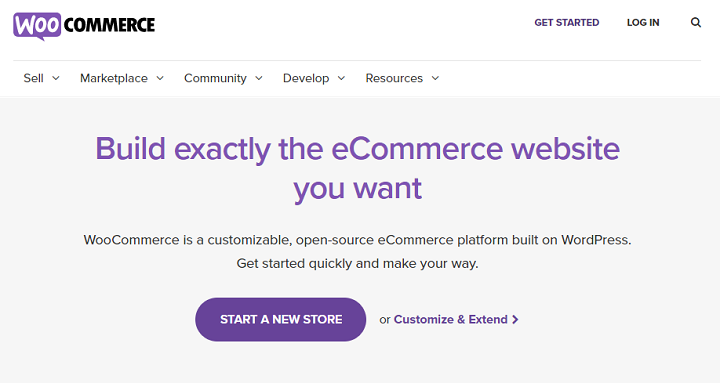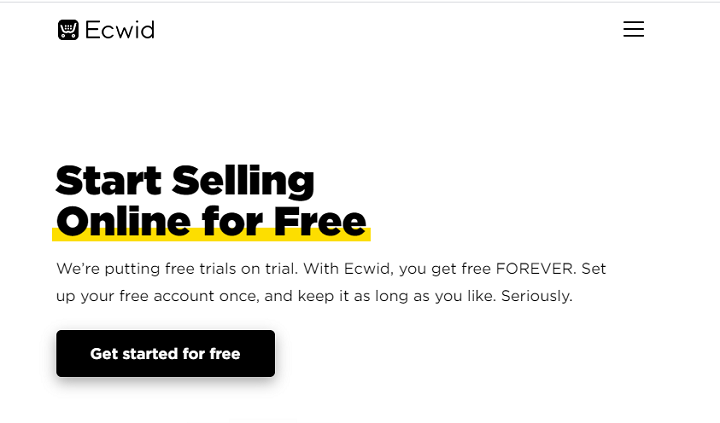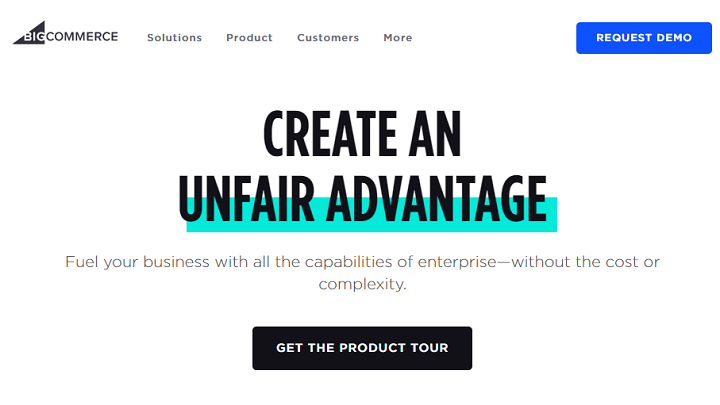WooCommerce is easily one of the most popular ways to run an online store.
As the ultimate eCommerce plugin for WordPress, it appeals to countless business owners worldwide. Not only is WooCommerce cost-effective for many organizations, but it’s easy to use and flexible too. Like other WordPress plugins, you can use WooCommerce alongside various other tools.
However, there’s no one-size-fits-all way to create the perfect digital shop.
In some situations, WooCommerce might not be the right option for you.
After all, what if you’re not a WordPress fan, or you just need a different kind of functionality than you can get from WooCommerce?
Today, we’re going to introduce you to some of the best WooCommerce alternatives available right now.
The Pros and Cons of WooCommerce

Before we begin looking at alternatives for WooCommerce, let’s look at the reasons you might, or might not want to use this solution.
WooCommerce is a popular choice for store building because it belongs to the WordPress ecosystem. Currently, WordPress accounts for 67% of the CMS market share, and WooCommerce is it’s official store plugin. Most WooCommerce features are free to use with a GPL license.
Additionally, like WordPress, WooCommerce gives you tons of ways to customize your shop. You can add themes, change your checkout process, and more. However, there are some downsides to WooCommerce too. It doesn’t work with other CMS tools, and some components can be expensive.
Pros:
- Ideal for WordPress fans
- Lots of themes and features to choose from
- Excellent community
- Customizable checkout
- Works with various currencies
- User accounts available
Cons:
- Only works with WordPress
- Some features are expensive
Let’s take a look at how some of the biggest WooCommerce alternatives compare.
1. Ecwid

WooCommerce may be the most popular solution for WordPress stores, but it’s not the only option. If you’re a WordPress fan but you want something a little different, then you could consider Ecwid instead. Founded in 2009, this tool helps countless companies get started online.
You can use Ecwid with your WordPress website, and access features like multi-channel integration with Amazon and eBay too. Ecwid offers automated shipping, payment, and taxes tools. There’s also a mobile optimized interface for using your solution on the move.
If you’re already selling with WooCommerce, Ecwid also makes it easy to switch over.
Pricing: There’s a free-to-use version which allows you to sell up to 10 products. However, you don’t get features like SEO, abandoned cart recovery, and reporting. Paid plans start at $15 each month and go all the way up to $99 each month.
Pros:
- Works well with WordPress
- Easy to use with lots of features
- Customizable experience for checkouts
- Free to use for beginners
Cons:
- Not as many sales tools as WooCommerce
2. Shopify

The most common reason to want an alternative to WooCommerce, is that you don’t want to use WordPress as your CMS. If that’s the case, then your best choice might be Shopify. Shopify is one of the most trustworthy and reliable online store builders around.
All Shopify plans come with access to a range of tools for building the perfect online store. You can sell a virtually unlimited number of products. Digital or physical products are available. Plus, there’s also multi-channel integration for selling on social media and other channels.
Shopify helps companies to strengthen their relationships with their customers. Tools like abandoned cart recovery boost your chances of getting a sale. Plus, discount codes mean that you can lure more clients to your doorstep.
Pricing: There’s a fourteen day free trial to get you started with Shopify. After that, you’ll need to choose one of the premium plans, which include Basic Shopify for $29 each month, Shopify for $79 each month, or Advanced Shopify, for $299 each month. There are also other tools like Shopify Lite, which doesn’t offer eCommerce, and Shopify Plus, which is for enterprise customers.
Pros:
- Access to multi-channel selling across social media and more
- Brilliant back-end system with great inventory management
- Large community full of people to help you
- Good for customer service and support
- Wide range of sales features
Cons:
- There’s a transaction fee unless you use Shopify Payments
- You can’t switch your theme if you decide you want a change without losing your content.
3. BigCommerce

BigCommerce is an eCommerce solution that’s similar to Shopify. The service was built from the ground-up for creating online stores, and there are plenty of tools within that can help you to earn more sales.
The biggest difference between BigCommerce and Shopify are the built-in features. Shopify gives companies a way to enhance their store builder with integrations and add-ons. On the other hand, BigCommerce comes with everything you need already built-in.
Like many leading sales tools, BigCommerce offers multi-channel integrations so you can sell through various marketplaces like Amazon and eBay. You can also design your own coupons and discounts and take advantage of advanced SEO tools.
Pricing: There are three premium plan options available for BigCommerce. None of these plans feature a transaction fee. The cheapest plan is the Standard option, with a fee of $29.95 per month. Next, you have Plus, for $79.95, and Pro, for $249.95 per month.
Pros:
- Scalable solution or any size store
- Lots of built-in features (more than WooCommerce)
- Can sell across multiple channels
- SEO tools are particularly good
- Great customer service
Cons:
- User interface is complicated for beginners
- No free option
4. Squarespace

Squarespace is a popular online store builder, and a great WooCommerce alternative. If you’re looking for a tool that’s easy to use and versatile, this could be the option for you. Squarespace allows you to buy your own domain name, and access various social media channels for sales. You also get a wide range of quality themes and designs to choose from.
Squarespace is an appealing choice for people who don’t want to use WooCommerce because it offers a great blogging platform. It can be difficult to find good content management tools outside of WordPress.
If you’re building a creative company and you want your store to look like it was built by a professional developer, then Squarespace is a good choice. This company also offers some of the best customers service around.
Pricing: Prices for Squarespace start at around $12 per month for the personal plan. However, you’ll need to upgrade a bit to the Business plan for $18 per month to access eCommerce features. There’s also a basic commerce plan for $26 per month that doesn’t have a transaction fee. Advanced commerce is $40 per month.
Pros:
- Beautiful themes and templates
- Wide pricing options to choose from
- Good blogging platform for content marketing
- Good customer service and support
- Easy to use for beginners
Cons:
- No free version available
- Doesn’t load as quickly as other options
5. Magento

Magento is another excellent choice on our list of WooCommerce alternatives. This solution comes with a range of great features to help you get your business up and running online. What’s more, companies can rest assured that their stores are secure and protected.
Magento makes it easier for businesses to connect with their customers, through a range of plugins and add-ons. You can segment your audience and send personalized marketing messages to them. Plus, the easy-to-use interface is great for customization. With various templates and themes to choose from, getting started is a breeze.
However, the premium plugins available from Magento are often much more expensive than the add-ons that you’ll find elsewhere. Additionally, compared to options like WooCommerce and Shopify, Magento may not be as easy to use.
Pricing: Because Magento is an open-source solution, it’s up to you to find things like hosting and domain names yourself. This makes the pricing structure quite similar to setting up a store with WooCommerce. However some people do say that building a site with Magento is often quite expensive.
Pros:
- Flexible and customizable
- Range of features like multiple languages and currencies
- Excellent community of users
- Mobile friendly and scalable
Cons:
- Quite expensive
- Complicated in places
6. Wix

Wix is one of the more simple products on the market for companies hoping to build an online store. Unlike tools such as BigCommerce and Shopify, this solution wasn’t built specifically for stores. However, you do have an excellent range of tools to bring your eCommerce environment to life.
Wix offers access to a variety of more than 500 templates. You can also tap into the drag-and-drop editor to customize your site however you choose.
If you don’t want to create a website on your own, then Wix’s team can do the hard work for you.
Wix also offers features like email marketing and store management systems where you can track your inventory and your customers. There’s even the option to add extra eCommerce plugins to your website.
Pricing: Wix offers a wide selection of pricing options, but there are only three packages that allow you to sell online. The Basic Business plan starts at $20 per month. You can also choose Business Unlimited for $25 per month, or Business VIP for $35 per month.
Pros:
- Simple drag-and-drop editor
- Easy-to-use interface
- Strong focus on branding
- Excellent range of customization options
- Good pricing
Cons:
- Not built specifically for stores
- Difficult to scale
Choosing the right WooCommerce Alternative
There are tons of alternatives to WooCommerce out there.
Some options allow you to plug store functionality into your existing website, like ECwid. Other options provide an entirely new CMS system where you can build your entire site.
There’s no one-size-fits-all option here.
If you’re looking for the ultimate alternative to WooCommerce and you don’t want to continue using WordPress, your best bet is probably Shopify. This tool offers the widest selection of features, and the best support for growing brands.
If you’ve decided that you want to stick with WooCommerce, check out our roundup of best WooCommerce themes to get started.
Good luck building your online store.

